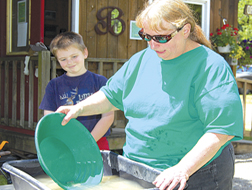
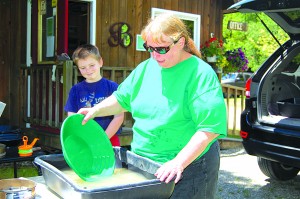
by Tena Starr
WESTFIELD — Terrie Davis-Perry has long supported cancer research, maybe more than most people. She’s regularly donated to the American Cancer Society and fund-raising events, and she sponsors a Relay for Life team member. But when the disease hit home last winter with her brother-in-law’s diagnosis of pancreatic cancer, she was inspired to do a little more aggressive fund-raising than she’d done in the past.
So on Saturday, Ms. Davis-Perry and her husband, Mark Perry, put together a special day of events and camping at their Barrewood Campground in Westfield. Proceeds from the $5 fee ($2 for children) for daytime activities went to Paul Perry for out-of-pocket costs for his treatment: camping fees throughout the weekend — three nights — will go to Relay for Life.
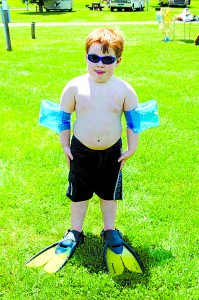
Saturday turned out to be a rare sunny day, although the wind was brisk enough to knock over some of the tents that vendors had set up on the big green at the campground to sell jewelry, crafts, baked goods, books, clothing, and other items. Inside the pavilion, a rousing game of bingo was in progress called by Debbie Lucas, who donated her time, and Mary Lee Daigle was serving a hot lunch. Pauline Couture of Couture’s Maple was on hand with a variety of maple products, and several members of Green Mountain Prospectors demonstrated how to pan for gold.
There was plenty of interest in that activity — nearly as much as in the bingo game.
The first thing you learn about panning for gold is you’re not likely to get rich. The second is that it isn’t nearly as easy as it looks when an expert is handling the pans. My own efforts netted one tiny flake that I might not have recognized were it not for Joanne Warner’s careful eyes, although gold is quite striking and definitely stands out if you know what you’re looking for.
Ms. Warner and Donald and Tracie Cassady were on hand to demonstrate the skill of panning and had small vials of gold, as well as garnets, to show for their own efforts. Mr. and Ms. Cassady are from New Hampshire and said the river near Littleton is “loaded with garnets,” a deep red, semi-precious gemstone that, like gold, is heavy and settles in the bottom of the pan.
Ms. Warner offered up a small vial of startlingly bright gold flecks that she’d gathered. They were worth about $30 or $40 — not a huge take for a tedious job.
“Most of the gold in Vermont is glacial, you won’t find big nuggets,” Ms. Warner said. That means glaciers ground the gold down to fine particles, as opposed to out West where actual nuggets are more likely to be found,
These three Green Mountain Prospectors don’t sell the gold they find, although they know some who do. Foundries will buy it, as well as jewelers and some collectors, they said. The garnets also have some value.
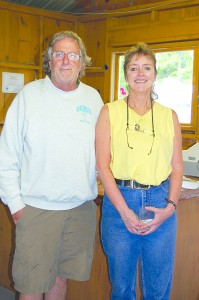
At this point, I have to admit that my notes kind of vanished on me because I gave panning a shot under Ms. Warner’s able guidance. I was decidedly inept and soaked myself and my notebook, ending up with a runny blue blur instead of careful notes.
So — winging it. We started with a shovel full of material from the bottom of the nearby brook, and Mr. Cassady did a sift to filter out the biggest stones. Those bigger stones are worth looking at, he said, because there’s lots of quartz among them, and that’s where gold comes from. But keeping in mind that chunks of gold the size of white quartz aren’t likely to appear in Vermont, the next step is to get to the littler stuff that looks mostly like sand. And that’s when it gets tricky.
The prospectors used green pans with ridged openings on one side. The idea is that you mix the sand and its potentially valuable contents with water, then slur it around, constantly dumping off the top layer through the pan’s openings. You trust that the heavier stuff, the valuable stuff, will stay at the bottom, and what you’re sloughing off is just sand and tiny worthless pebbles.
The equipment is neither complicated nor expensive. Most any kind of filter works up to a point. Mr. Cassady said his wife is always telling him to leave her flour sifter alone.
If you’re not too overzealous, or just sloppy, it works. The heavy stuff does stay in the bottom of the pan, and after a while the dirt changes color. It darkens as the lighter, and lighter colored, sand goes out the pan’s slots, and what remains is what’s of possible value. “Tap it, and the gold goes to the bottom,” Ms. Warner advised me.
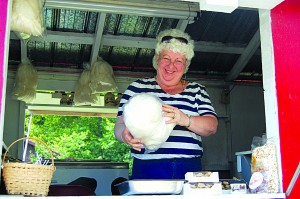
Gold is 19 times heavier than water, someone said as I slopped muddy water all over myself. Trust it.
I sloshed the pan around in the water, then sifted out the sand and did see the color eventually darkening, but it wasn’t easy, and I was clumsy, and I soon appreciated Ms. Warner’s skill. She said she’d won an award in a panning contest, which didn’t surprise me once I’d tried it myself. She makes panning look easy. It isn’t.
At the end, I had one flake of gold. It didn’t look real, and, nope, I wasn’t going home rich. Ms. Warner had planted it, and it went back into her vial via a special little bottle that sucked it up and returned it to where it came from.
But there are entirely worse things to do with one’s time than wade around in a brook in the hope of finding gold.
“It’s like fishing,” Ms. Warner said. “You can be out all day and you may not get a fish. But you enjoy being out there.”
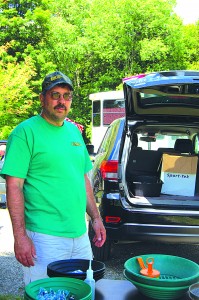
Green Mountain Prospectors has members from all over New England, as well as New York State, and many of them are members of a national prospecting club, as well.
Meanwhile, back in the pavilion, my 13-year-old son had settled in with a couple of his great-aunts and was avidly playing bingo.
Bingo used to be a game I understood, but apparently no longer. There’s still the traditional way of playing, where you win if you get straight hits in a horizontal, vertical, or diagonal line, but there are “specials” I’ve never heard of, like a check mark. Colton and his great-aunts were each playing eight cards.
The last game was something I’d never heard of, a coverall. My aunts, being the experienced bingo players they are, knew just what that meant — the winner would be the first person to fill up an entire card.
Prizes for the bingo winners were donated by local businesses and others and included gift certificates, homemade pies, and jewelry.
Later in the day, there was a potluck dinner at the campground, as well as live music, and a bonfire.
contact Tena Starr at [email protected]
For more free articles from the Chronicle like this one, see our Featuring pages. For all the Chronicle’s stories, pick up a print copy or subscribe, either for print or digital editions.







